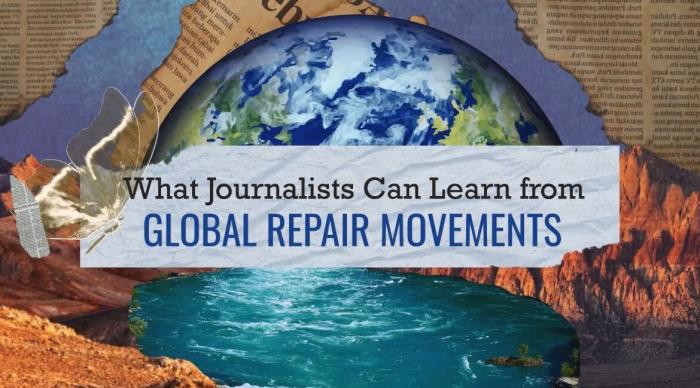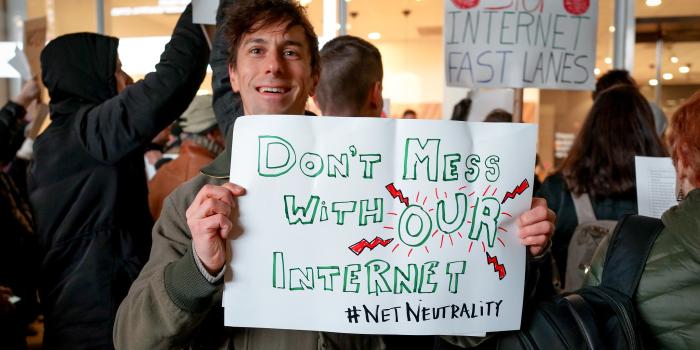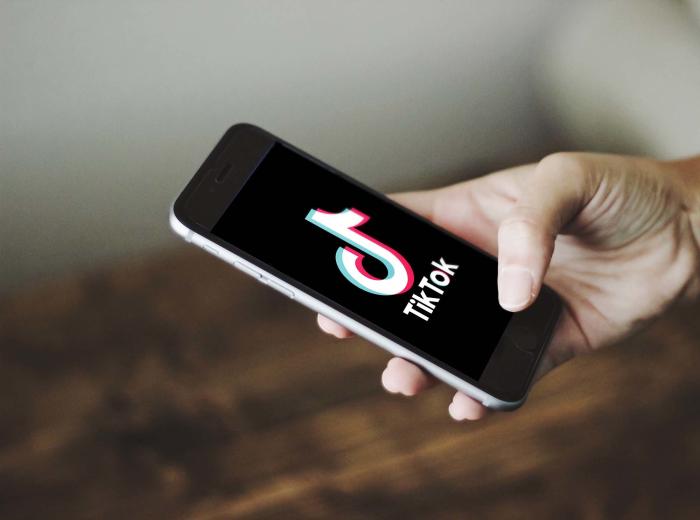Free Press Through the Years: Never Gonna Give up Net Neutrality
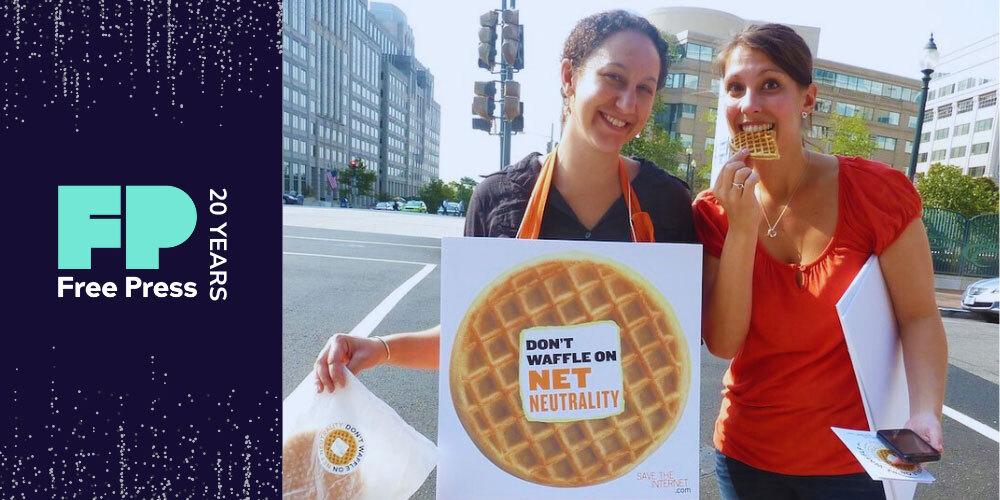
What do waffles, cardboard cats and rickrolling have in common?
They’ve all played a key role in Free Press campaigns.
In our 20-year history, we’ve often relied on unusual tactics. In addition to organizing petitions, protests and visits to lawmakers, we’ve gotten creative to get our point across.
Here are just a few standout moments from our decades-long Net Neutrality campaign:
Waffles for Net Neutrality
Whether you prefer cereal, soft-boiled eggs or smoothies, it’s close to impossible to resist breakfast. And it’s even harder to resist Leslie Knope’s favorite dish: waffles. Back in September 2010, we organized a protest outside the FCC’s headquarters, greeting agency staffers with waffles and a crucial message: “Don’t Waffle on Net Neutrality!”
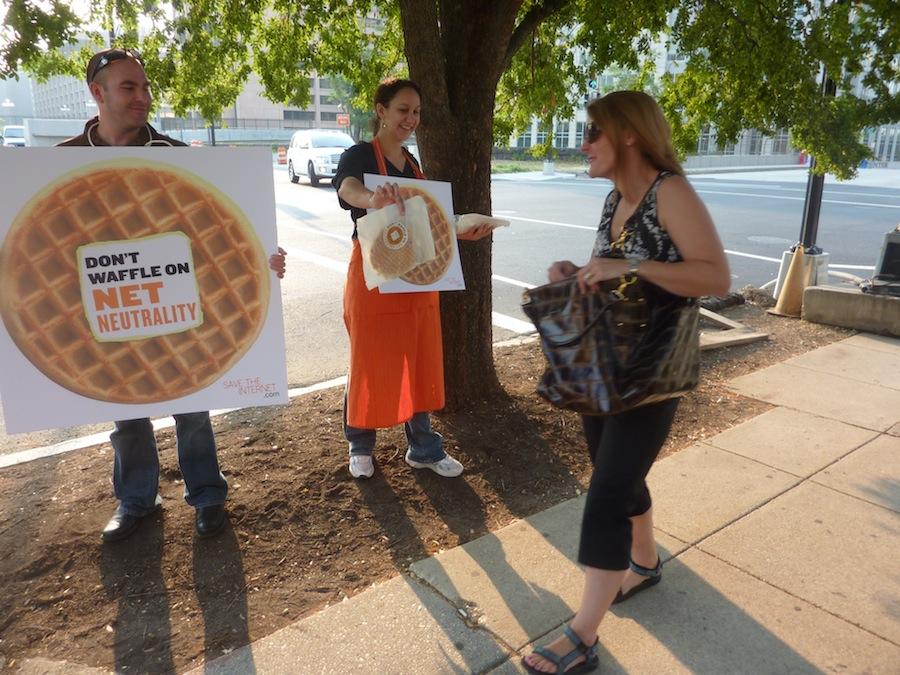
We served the waffles, topped with butter and syrup, in advance of the FCC’s monthly open meeting — which fell almost a year to the day from the time then-Chairman Julius Genachowski declared, “If we wait too long to preserve a free and open internet, it will be too late.”
Since then, the agency had failed to move forward with real Net Neutrality rules. A federal appeals court had ruled that an earlier FCC decision on the matter didn’t use the proper authority to regulate broadband. But instead of taking steps to restore the FCC’s authority, Chairman Genachowski dithered and dallied.
Free Press Co-CEO Craig Aaron, who was then the organization’s managing director, explained the decision to serve waffles. “The longer the FCC ponders the politics of Net Neutrality, the longer the public is left unprotected,” he said. “We cannot accept an internet with fast and slow lanes, where the biggest companies like AT&T, Comcast and Verizon get to choose the winners and losers online. Chairman Genachowski has the backing of [President Obama], congressional leadership and, most importantly, millions and millions of internet users. We all need him to stop waffling and start getting to work.”
We pushed Genachowski to adopt rules based in Title II of the Communications Act, which provides the strongest protections possible. The FCC instead embraced much weaker rules, which a court overturned in 2014. That gave us a new opportunity to fight for Title II …
Cats for the open internet
In the wake of the 2014 court ruling, the new FCC chairman, Tom Wheeler, initially released a proposal that would have allowed broadband providers like AT&T, Comcast and Verizon to destroy the internet’s level playing field and charge for speedier access online. We kicked off a massive campaign that included lots of protests, a record number of petition signatures and millions of pro-Net Neutrality comments directed at the FCC. It also involved cats.
Cats are the internet’s unofficial mascots. So after months of organizing actions in cities across the country — and after getting President Obama to come out in favor of Title II — we enlisted a fleet of felines in our push to get the FCC to adopt Title II Net Neutrality rules.
Early on a January morning in 2015, hours before the FCC’s first open meeting of the year, we placed 400 cardboard cats we’d made on the lawn outside agency headquarters. Bearing slogans like “Title II is purr-fect,” the cardboard kitties shared the space with a collection of plush cats, including Grumpy Cat. Taking the joke a beat further, we staged a faux fight between a Free Presser in a cat costume and someone outfitted as an old-timey cigar-chomping CEO (representing executives at AT&T, Comcast and Verizon).
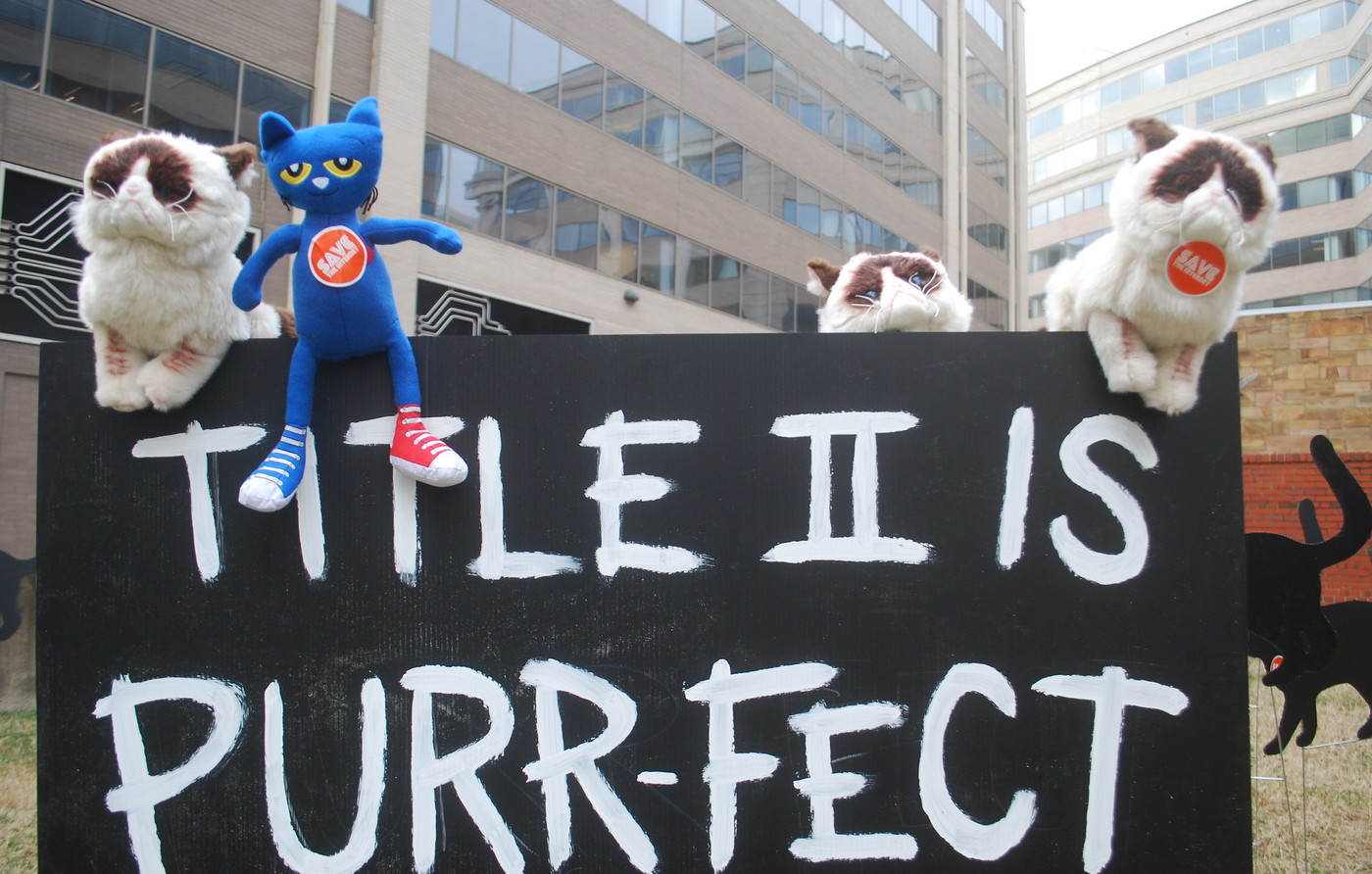
Needless to say, Net Neutral-i-kitty prevailed … and just a few weeks later, the FCC adopted Title II rules.
Rickrolling the chairman
As soon as Trump nominated Ajit Pai to serve as the FCC’s chairman, Pai — a former Verizon lobbyist — made it clear that he planned to repeal these hard-won Net Neutrality rules. “We need to fire up the weed whacker and remove those rules,” he told a conservative think tank.
Pai moved forward on his plan just a few months into his tenure, releasing a proposal to overturn the protections. In the ensuing months, Free Press launched a nationwide campaign filled with bold tactics — including one that owed something to ’80s heartthrob Rick Astley.
For the uninitiated: A rickroll is a meme where tricksters fool people into clicking a link to a video featuring Astley’s biggest hit, “Never Gonna Give You Up.” It’s a prank that symbolizes the internet’s lighter side. During an open FCC meeting in 2017, several Free Press staffers and activists interrupted a speech Pai was giving, blasting the Astley bop over a speaker while singing modified lyrics like “Never gonna give you up, Net Neu-tral-ity, never gonna run around and hurt you.”
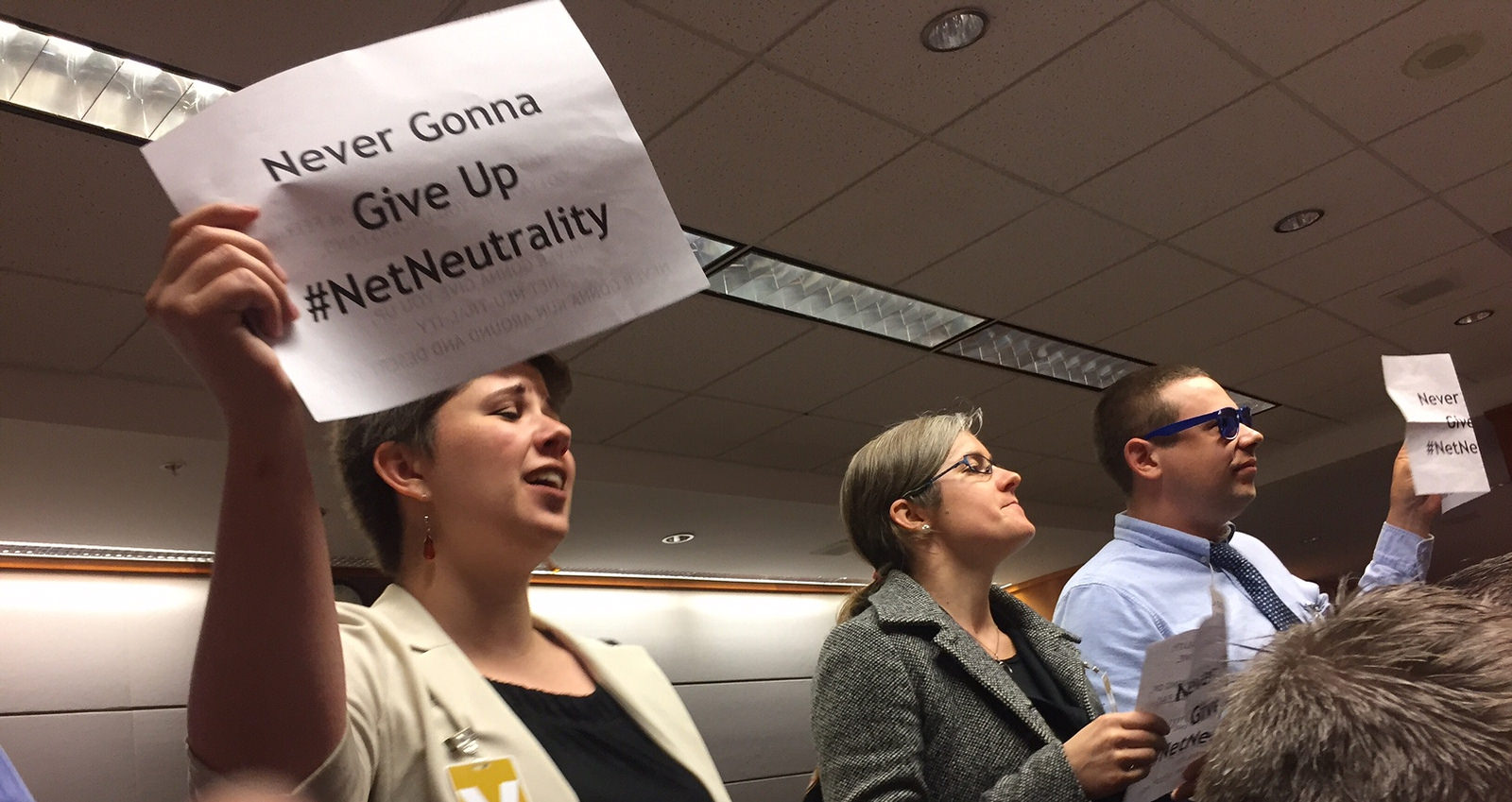
Department of Homeland Security officers escorted the crew from the building, and five of the Free Pressers were banned from entering FCC headquarters in the future. But it was worth it.
700 protests in one day
Free Press has held countless protests over the years, organizing huge events in local communities, outside the FCC, and outside the headquarters of companies including Comcast, Sinclair and Twitter.
Back in 2017, we teamed up with Demand Progress and Fight for the Future to mobilize activists in advance of the FCC’s vote on Pai’s proposal to destroy Net Neutrality. We chose Verizon — Pai’s old employer — as the target for the day of action. The event succeeded beyond our grandest expectations: Hundreds of Net Neutrality supporters protested outside more than 700 Verizon stores in all 50 states plus D.C.
Activists also rallied at nearly 20 congressional in-district offices, and outside the Washington Hilton Hotel during the FCC Chairman’s Dinner, the annual insidery roast for the head of the agency. There, more than 100 protesters — including FCC Commissioners Mignon Clyburn and Jessica Rosenworcel — greeted Ajit Pai.
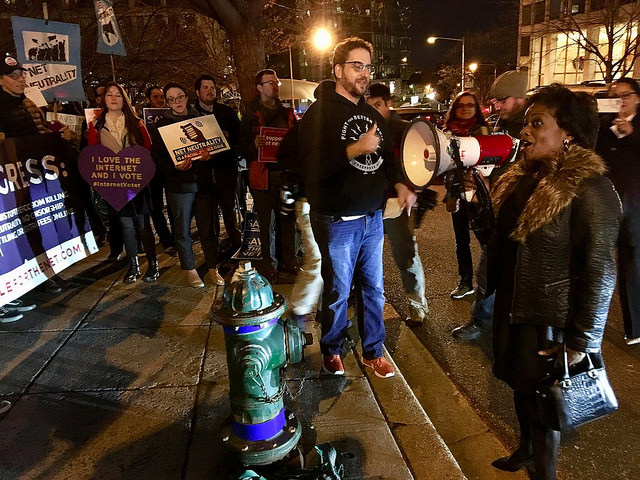
True to form, Pai ignored the enormous public outcry — and in a party-line vote the Trump FCC repealed the Obama-era rules. But the mass mobilization showed just how invested people are in keeping the internet free and open.
A new era at the Biden FCC
We now have our best chance in years to win back Net Neutrality. On Sept. 7, 2023, the Senate voted to confirm Anna Gomez to serve as the FCC’s fifth commissioner — ending a 960-day deadlock at the agency. The unprecedented delay was the result of concerted efforts by the phone, cable and broadcast lobbies to hamstring the agency that oversees their businesses.
With Gomez’s confirmation, the Biden FCC finally has the votes it needs to reinstate Title II Net Neutrality. We know from experience that companies like AT&T, Comcast and Verizon will pull out all the stops to hinder the agency. But their armies of lawyers and lobbyists are no match against well-organized activists ready to don catsuits, serve up waffles and do whatever it takes to capture the public imagination and restore the open-internet protections that make much of this creativity possible.
Help Free Press fight back with a donation today.
Check out the other posts in our 20th-anniversary blog series.



